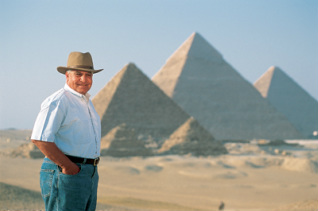
A Little About Zahi
Zahi Hawass who was born on May 28, 1947, is an egyptian archaeologist, an Egyptologist, and former Minister of State for Antiquities Affairs. He has also worked at archaeological sites in the Nile Delta, the Western Desert, and the Upper Nile Valley.
Hawass has received widespread publicity internationally, and was the subject of a reality television series in the United States, Chasing Mummies. His views and links to business ventures and the Mubarak regime have created much controversy. He was sentenced to a prison term, which was later lifted, in connection with the awarding of a gift shop contract at the Egyptian Museum.
Life and Career
Hawass was born in Damietta, Egypt. He originally intended to become a lawyer, but then studied Greek and Roman archaeology at Alexandria University, where he obtained an B.Sc. degree. He obtained a diploma in Egyptology at the University of Cairo. In 1987 he received his PhD from the University of Pennsylvania where he studied.
After 1988 Hawass taught Egyptian archaeology, history and culture, mostly at the American University in Cairo and the University of California, Los Angeles. In 1993 he left his position as Chief Inspector of the Giza Pyramid Plateau. According to Hawass, he resigned. Others claim, however, that he was fired because a valuable ancient "statue" under the custody of Hawass was stolen from Giza. He was reinstated as Chief Inspector in early 1994. In 1998 he was appointed as director of the Giza Plateua. In 2002 he was appointed Secretary General of the Egyptian Supreme Council of Antiquities.
When President Barack Obama was in Cairo in June 2009, Hawass gave him personal tours of the sites of ancient Egypt. At the end of 2009 he was promoted personally by President Hosni Mubarak to the post of Vice Minister of Culture.
In the midst of the 2011 Egyptian protests, Hawass arrived at the Egyptian Museum on January 29, 2011 to find that a number of cases had been broken into and a number of antiquities were damaged. Police later secured the museum. Hawass was reported to have faxed a colleague that 13 cases were destroyed and to have said, "My heart is broken and my blood is boiling."Hawass later told the New York Times that thieves looking for gold broke 70 objects, including two sculptures of King Tutankhamen, and took two skulls from a research lab before being stopped as they were leaving the museum.
DNA
Zahi Hawass who was born on May 28, 1947, is an egyptian archaeologist, an Egyptologist, and former Minister of State for Antiquities Affairs. He has also worked at archaeological sites in the Nile Delta, the Western Desert, and the Upper Nile Valley.
Hawass has received widespread publicity internationally, and was the subject of a reality television series in the United States, Chasing Mummies. His views and links to business ventures and the Mubarak regime have created much controversy. He was sentenced to a prison term, which was later lifted, in connection with the awarding of a gift shop contract at the Egyptian Museum.
Life and Career
Hawass was born in Damietta, Egypt. He originally intended to become a lawyer, but then studied Greek and Roman archaeology at Alexandria University, where he obtained an B.Sc. degree. He obtained a diploma in Egyptology at the University of Cairo. In 1987 he received his PhD from the University of Pennsylvania where he studied.
After 1988 Hawass taught Egyptian archaeology, history and culture, mostly at the American University in Cairo and the University of California, Los Angeles. In 1993 he left his position as Chief Inspector of the Giza Pyramid Plateau. According to Hawass, he resigned. Others claim, however, that he was fired because a valuable ancient "statue" under the custody of Hawass was stolen from Giza. He was reinstated as Chief Inspector in early 1994. In 1998 he was appointed as director of the Giza Plateua. In 2002 he was appointed Secretary General of the Egyptian Supreme Council of Antiquities.
When President Barack Obama was in Cairo in June 2009, Hawass gave him personal tours of the sites of ancient Egypt. At the end of 2009 he was promoted personally by President Hosni Mubarak to the post of Vice Minister of Culture.
In the midst of the 2011 Egyptian protests, Hawass arrived at the Egyptian Museum on January 29, 2011 to find that a number of cases had been broken into and a number of antiquities were damaged. Police later secured the museum. Hawass was reported to have faxed a colleague that 13 cases were destroyed and to have said, "My heart is broken and my blood is boiling."Hawass later told the New York Times that thieves looking for gold broke 70 objects, including two sculptures of King Tutankhamen, and took two skulls from a research lab before being stopped as they were leaving the museum.
DNA
